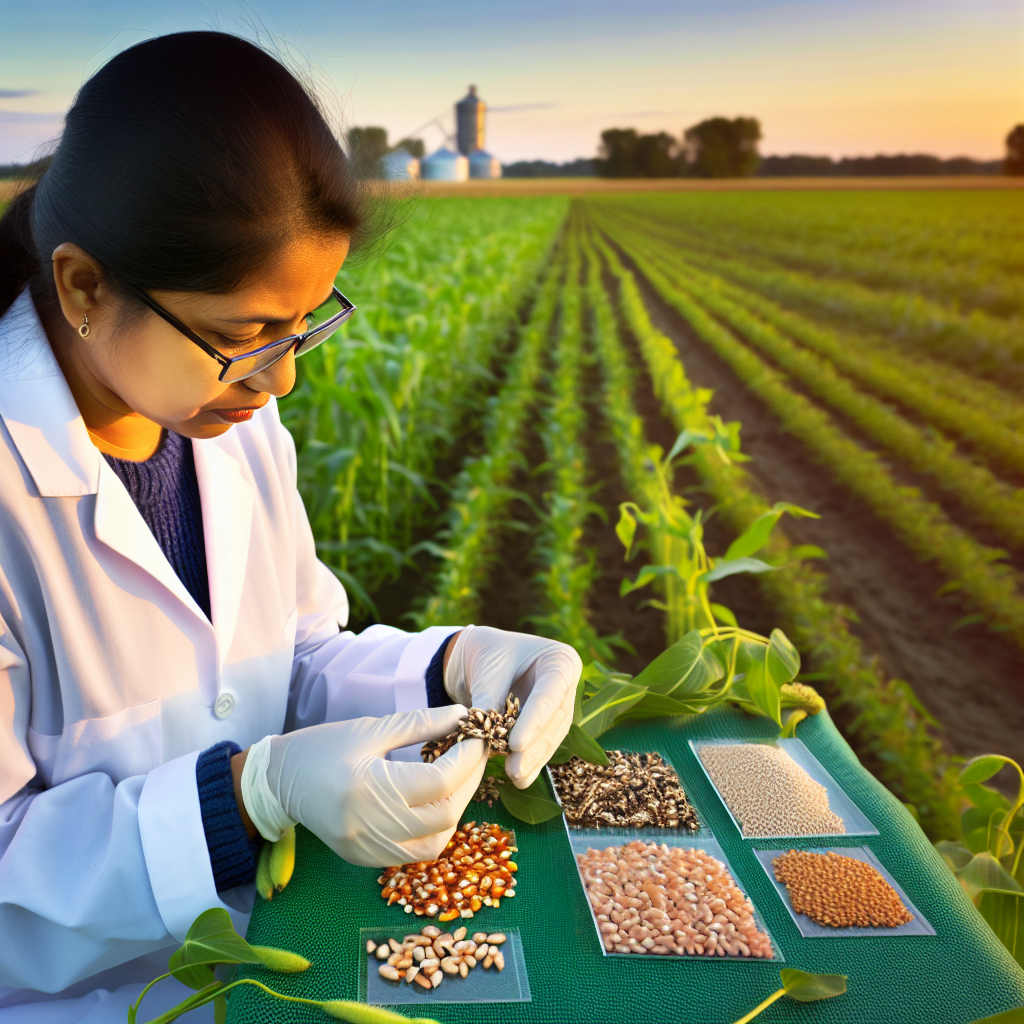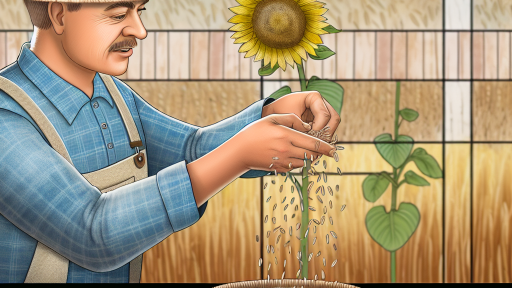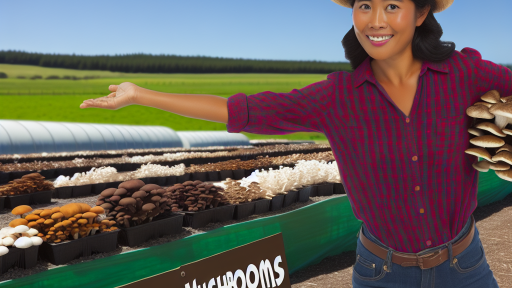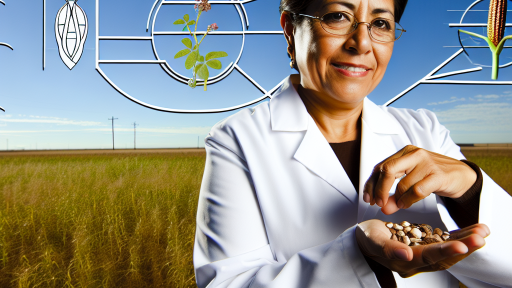Introduction to Seed Selection and Its Importance in Crop Resilience
Seed selection plays a critical role in agriculture.
Farmers need to choose the right seeds for successful farming.
Resilient crops can withstand various environmental challenges.
These challenges may include drought, disease, and pests.
Choosing resilient seeds helps ensure food security.
Farmers must make informed decisions about seed varieties.
This decision affects yield and overall crop health.
Additionally, seed selection impacts sustainability practices.
Better seed choices lead to reduced reliance on chemicals.
One important factor is adapting seeds to local conditions.
Local climate and soil quality greatly influence crop resilience.
Farmers should consider historical performance data of seed types.
Mixing different seed varieties can enhance biodiversity.
Researchers also highlight the importance of hybrid seeds.
Hybrid seeds often offer higher yields and disease resistance.
Transform Your Agribusiness
Unlock your farm's potential with expert advice tailored to your needs. Get actionable steps that drive real results.
Get StartedHowever, they may require specific management practices.
Ultimately, educating farmers about seed choice is essential.
This education can empower them to make strategic decisions.
Informed decisions can lead to improved crop resilience.
Successful seed selection promotes healthier ecosystems.
Factors Influencing Seed Selection for Resilient Crops
Understanding Environmental Conditions
Environmental conditions play a crucial role in seed selection.
Farmers must consider soil type, climate, and moisture levels.
A comprehensive understanding enhances crop resilience.
For instance, drought-resistant seeds thrive in dry conditions.
Conversely, flood-tolerant seeds are ideal for wetter environments.
Assessing Genetic Diversity
Genetic diversity is essential for crop resilience.
Diverse seed varieties can adapt better to changing conditions.
This adaptability enables crops to withstand pests and diseases.
Farmers should select seeds from genetically diverse sources.
Cross-breeding promotes beneficial traits in new varieties.
Evaluating Disease Resistance
Disease resistance significantly impacts crop success.
Farmers must choose seeds with proven resistance to local diseases.
Seed testing can reveal traits that prevent disease spread.
Healthy seeds can lead to robust harvests and increased yield.
Additionally, resistant crops lower the need for chemical treatments.
Consideration of Agronomic Traits
Agronomic traits affect how seeds perform under various conditions.
Farmers should evaluate traits such as growth rate and yield potential.
Seeds with strong agronomic traits yield more significant harvests.
Farmers also need to consider plant height and maturity time.
Showcase Your Farming Business
Publish your professional farming services profile on our blog for a one-time fee of $200 and reach a dedicated audience of farmers and agribusiness owners.
Publish Your ProfileSelecting seeds aligned with desired agronomic traits is vital.
Market Demand and Economic Viability
Market demand influences seed selection choices.
Farmers must align their crop choices with consumer preferences.
High-demand crops can lead to better economic returns.
Additionally, understanding local markets supports seed selection.
Economic viability ensures sustainable farming practices.
Utilization of Precision Agriculture Techniques
Advancements in technology enhance seed selection capabilities.
Precision agriculture provides data-driven insights for farmers.
Farmers can analyze soil health, pest occurrences, and weather data.
This analysis helps in making informed seed selection decisions.
Utilizing technology promotes efficient resource use in farming.
Understanding Genetic Diversity in Seed Selection
Importance of Genetic Diversity
Genetic diversity plays a critical role in agriculture.
It enhances crop resilience to diseases and pests.
Moreover, it promotes adaptability to climate change.
Farmers benefit from increased yield stability over time.
Thus, selecting diverse seeds supports sustainable farming practices.
Defining Genetic Diversity
Genetic diversity refers to the variety of genes within a species.
Each plant variety contributes unique traits to the gene pool.
This variety results from natural evolution and human cultivation.
Consequently, diverse crops are more resilient in changing environments.
Techniques for Assessing Genetic Diversity
Several methods exist to evaluate genetic diversity in crops.
- DNA sequencing provides precise genetic information.
- Phenotypic analysis evaluates physical characteristics.
- Marker-assisted selection identifies specific genes.
Utilizing these techniques enhances seed selection processes.
Strategies for Promoting Genetic Diversity
Farmers can adopt various strategies to promote genetic diversity.
- Utilizing heirloom varieties fosters genetic variation.
- Practicing crop rotation reduces disease impact.
- Engaging in seed exchanges broadens genetic resources.
Such strategies contribute to a robust agricultural system.
The Role of Seed Banks
Seed banks play a vital role in preserving genetic diversity.
They collect and maintain diverse plant seeds for future use.
Additionally, seed banks support research and breeding initiatives.
Consequently, they enhance food security and resilience.
See Related Content: Common Mistakes in Hydroponic Farming
Traditional vs. Hybrid Seed Selection Techniques
Overview of Traditional Seed Selection
Traditional seed selection relies on natural breeding methods.
Farmers select seeds based on observed traits over generations.
This technique enhances local adaptability and resilience.
Consequently, traditional methods foster biodiversity in crops.
Advantages of Traditional Methods
One of the main benefits is the preservation of local varieties.
Traditional seeds often showcase resilience to specific diseases.
Additionally, these practices are cost-effective for small farms.
Challenges of Traditional Seed Selection
However, traditional methods may yield slower improvements.
The reliance on natural selection can limit genetic diversity.
Moreover, climate change poses challenges for traditional crops.
Introduction to Hybrid Seed Selection
Hybrid seed selection emerged as a response to agricultural demands.
Showcase Your Farming Business
Publish your professional farming services profile on our blog for a one-time fee of $200 and reach a dedicated audience of farmers and agribusiness owners.
Publish Your ProfileThis technique combines traits from different parent lines.
As a result, hybrid seeds often exhibit improved vigor and yield.
Benefits of Hybrid Seed Selection
Hybrid seeds typically offer greater resistance to pests and diseases.
They often produce higher yields compared to traditional seeds.
Moreover, hybrids can adapt more quickly to changing environments.
Challenges of Hybrid Methods
Nonetheless, hybrid seeds can have drawbacks for farmers.
They usually require purchasing new seeds each season.
This necessity can increase costs and dependency on seed companies.
Comparative Analysis of Techniques
Both methods have unique advantages and disadvantages.
Traditional selection fosters biodiversity and sustainability.
In contrast, hybrid methods prioritize high yields and resilience.
Farmers must weigh these factors when choosing their approach.
Discover More: Enhancing Biodiversity on Organic Farms
Evaluating Local Adaptation
Importance of Local Adaptation
Local adaptation enhances the resilience of crops in diverse environments.
It allows plants to thrive amidst varying climatic conditions.
Additionally, local adaptation significantly improves yields.
Assessing Soil Conditions
Soyl health plays a pivotal role in crop success.
Evaluate nutrient levels, pH, and moisture retention.
This information guides your seed selection.
Climate Considerations
Understand the climate patterns in your area.
Temperature extremes can stress plants.
Consider precipitation levels during the growing season.
Choosing the Right Seed Varieties
Select seed varieties known for local resilience.
Consult local agricultural extension services for recommendations.
Consider heirloom varieties that have adapted over generations.
Field Trials and Observations
Conduct small-scale field trials before full-scale planting.
Observe performance under varying conditions.
This practice allows for informed adjustments in seed selection.
Engaging with Local Farmers
Collaborate with local farmers to gain insights.
Sharing experiences can aid in selecting effective seeds.
Consider forming seed-saving co-ops for better adaptability.
Using Technology for Selection
Leverage technology to analyze local growing conditions.
Soil sensors can provide real-time data.
Utilize mobile apps for farmers to share seed performance data.
Delve into the Subject: Selecting Plants Ideal For Container Farming
Importance of Seed Health and Quality Control
Understanding Seed Health
Seed health is crucial for successful crop production.
Healthy seeds lead to robust plant growth.
They are less susceptible to diseases and pests.
Moreover, healthy seeds contribute to higher yields.
Quality Control Measures
Implementing quality control ensures seed integrity.
Showcase Your Farming Business
Publish your professional farming services profile on our blog for a one-time fee of $200 and reach a dedicated audience of farmers and agribusiness owners.
Publish Your ProfileRegular testing helps identify any potential problems.
This includes checking for pathogens and contaminants.
Additionally, assessing germination rates is essential.
Factors Affecting Seed Quality
Several factors influence seed quality significantly.
Environmental conditions play a major role.
Temperature and humidity can affect seed viability.
Furthermore, handling practices during storage matter greatly.
Benefits of High-Quality Seeds
Using high-quality seeds enhances crop resilience.
They can better withstand environmental stressors.
In addition, they provide improved flavor and nutrition.
Farmers save time and resources with quality seeds.
Investing in Seed Health for a Sustainable Future
Investing in seed health is investing in the future.
Quality control measures are crucial for sustainability.
Ultimately, healthy seeds lead to a thriving agricultural ecosystem.
Uncover the Details: Designing Paths in Edible Landscapes

Utilizing Technology: Precision Agriculture in Seed Selection
The Role of Precision Agriculture
Precision agriculture enhances the effectiveness of seed selection processes.
This method utilizes advanced technology to optimize crop production.
Farmers can gather and analyze data to make informed decisions.
As a result, they can select seeds that suit specific soil and climate conditions.
Furthermore, precision agriculture reduces waste and increases efficiency.
Data Collection Techniques
Data collection forms the backbone of precision agriculture.
Farmers can use sensors to monitor soil moisture and nutrient levels.
Satellite imagery offers insights into crop health and growth patterns.
Drone technology provides a detailed aerial view of the farmland.
All these tools contribute to better seed selection by identifying optimal conditions.
Analyzing Soil Health
Healthy soil is critical for resilient crop development.
Farmers can analyze soil samples to determine fertility levels.
Tests reveal pH, organic matter, and microbial activity in the soil.
This information helps farmers choose seeds that thrive in their specific environment.
Seed Variety Trials
Conducting variety trials allows farmers to assess seed performance.
Farmers can plant multiple seed varieties within controlled plots.
They analyze growth rates, yield potential, and disease resistance.
This hands-on approach leads to better seed selection based on real-world results.
Integration of Software Solutions
Software solutions streamline the seed selection process.
Farm management software helps track data and make informed choices.
These tools can integrate findings from various sources like weather forecasts.
Consequently, farmers can predict how seeds will perform under specific conditions.
Adoption of New Technologies
The agricultural sector is rapidly adopting new technologies.
Farmers are increasingly using machine learning to refine seed selection.
This technology predicts crop outcomes based on historical data.
Showcase Your Farming Business
Publish your professional farming services profile on our blog for a one-time fee of $200 and reach a dedicated audience of farmers and agribusiness owners.
Publish Your ProfileThus, farmers can choose the best seed variants for future planting.
Ultimately, embracing innovation fosters resilience in crop production.
Case Studies: Successful Seed Selection Strategies Across Various Crops
Corn: Breeding for Drought Resistance
Corn is a staple crop globally.
Its resilience is vital.
Recent studies by BioAgri Innovations showcased effective seed selection practices.
They focused on drought-resistant phenotypes.
This selection enhanced yield during dry seasons significantly.
Tomatoes: Enhancing Disease Resistance
Tomatoes face various fungal diseases, threatening production.
Greenfield Farms implemented strategic cross-breeding techniques.
They emphasized selecting seeds with natural resistance genes.
This approach resulted in a healthier crop with reduced pesticide use.
Wheat: Adaptation to Climate Change
Wheat is sensitive to climate changes, requiring adaptive strategies.
Harvest Investments led a project on selecting heat-tolerant varieties.
Field trials demonstrated improved yields under higher temperature conditions.
Farmers benefited from this innovation as drought conditions increased.
Rice: Improving Nutritional Value
Nutritional quality is essential for food security globally.
EcoPlant Solutions focused on biofortification in rice selections.
They prioritized high iron and zinc content in breeding lines.
This strategy successfully addressed malnutrition in several communities.
Beans: Maximizing Protein Content
Beans are crucial for plant-based diets, especially in developing nations.
NutriSelect partnered with local farmers for high-protein bean varieties.
They emphasized selecting seeds based on nitrogen-fixing capabilities.
As a result, farmers reported increased protein yield per hectare.
Sunflowers: Enhancing Oil Yield
Sunflower oil is a key vegetable oil worldwide.
Sunny Fields Co. implemented innovative seed selection for oil content.
The focus was on hybrid varieties with higher oil production rates.
Farmers embraced these seeds, leading to higher profit margins.
Future Trends in Seed Selection for Sustainable Agriculture
Advancements in Genetic Research
Genetic research is revolutionizing seed selection techniques.
Scientists are developing seeds with enhanced resilience to climate change.
Furthermore, research focuses on traits like drought tolerance and disease resistance.
Integration of Technology
Technology plays a pivotal role in modern seed selection.
Farmers increasingly utilize precision agriculture tools.
These tools help in analyzing soil health and selecting optimal seed types.
Moreover, data analytics can guide seed choices based on environmental conditions.
Emphasis on Biodiversity
Biodiversity remains essential for sustainable agriculture.
Diverse seed varieties can improve ecosystem resilience.
Additionally, they can provide natural pest control and improve soil health.
Consequently, many organizations promote the preservation of heirloom seeds.
Consumer Awareness and Preferences
Consumer awareness increasingly influences seed selection trends.
There’s a growing demand for organic and non-GMO seeds.
Showcase Your Farming Business
Publish your professional farming services profile on our blog for a one-time fee of $200 and reach a dedicated audience of farmers and agribusiness owners.
Publish Your ProfileAs a result, farmers are adapting their practices to meet this demand.
Transparency in sourcing and production is becoming crucial.
Regulatory Changes
Regulatory frameworks are evolving to support sustainable practices.
New policies encourage the use of environmentally friendly seeds.
Compliance with these regulations can enhance market access for farmers.
Furthermore, it aligns agriculture with global sustainability goals.
Collaboration and Knowledge Sharing
Collaboration among farmers, researchers, and policymakers is vital.
Knowledge sharing initiatives can lead to better seed selection practices.
Networking opportunities help spread innovative techniques across regions.
In addition, partnerships can fund research on resilient crop varieties.
Additional Resources
Partnerships for Climate-Smart Commodities Project Summaries …
The Three Sisters of Indigenous American Agriculture | National …




